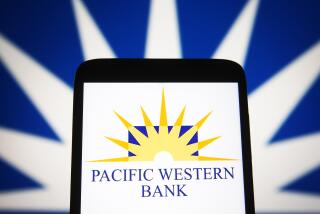A New Deal for First Interstate : Q & A : Deal to Have Minimal Impact on Customers
- Share via
Unlike a merger between Wells Fargo & Co. and First Interstate Bancorp, the proposed $10.1-billion union of First Interstate and First Bank System Inc. of Minneapolis would create no overlap of business in California.
Q: How would First Interstate customers be affected?
A: Presumably, California customers of First Interstate would be affected minimally--at least for the foreseeable future. The fact that First Bank has no operations in the state would suggest that most of First Interstate’s 430 branches would remain open.
Q: Would fees for checking accounts, loans and other services rise?
A: It is too early to speculate on any changes in fees. However, if Wells and First Interstate both remain on the landscape instead of joining forces, their rivalry--at least in theory--should benefit consumers as the banks compete for customers.
Q: Are there any possible benefits for First Interstate customers?
A: The bank’s individual and corporate customers could benefit in a couple of ways. First, the two companies use compatible computer systems that would make it easy to provide better bank-by-phone services.
First Bank is also the nation’s leader in offering purchase-card services to corporate customers. Such services enable managers to devise budgets and hand out credit cards with preset spending limits to departments or individual workers. Managers can thus better monitor their budgets.
First Bank is also considered to be advanced in “merchant processing”--the handling of credit card transactions for stores. Before the announcement of the proposed merger, First Interstate had considered outsourcing this function to First Bank. In both these areas, the combined bank could spread costs over a much larger customer base and offer First Bank services to more customers.
Q: What happens to jobs and community lending programs in Los Angeles and California?
A: Under the proposed agreement, the merged banks would take the name First Interstate and be based in Minneapolis. However, Los Angeles would be the base of operations for the core business lines--retail and corporate banking, payment systems and trust and investment management. The banks said First Interstate would maintain its community support. In a normal year, the bank donates about $2 million to philanthropic causes in Los Angeles. Since 1992, it has committed to $200 million in loans for such projects as affordable housing construction and small-business development.
The 6,000 jobs that would be pared--from a total base of 41,000 at the two banking companies--would be spread over a 21-state system. The employees who probably would suffer the most would be upper- and mid-level management. But bank executives said much of the reduction could be accomplished through attrition.
More to Read
Inside the business of entertainment
The Wide Shot brings you news, analysis and insights on everything from streaming wars to production — and what it all means for the future.
You may occasionally receive promotional content from the Los Angeles Times.











